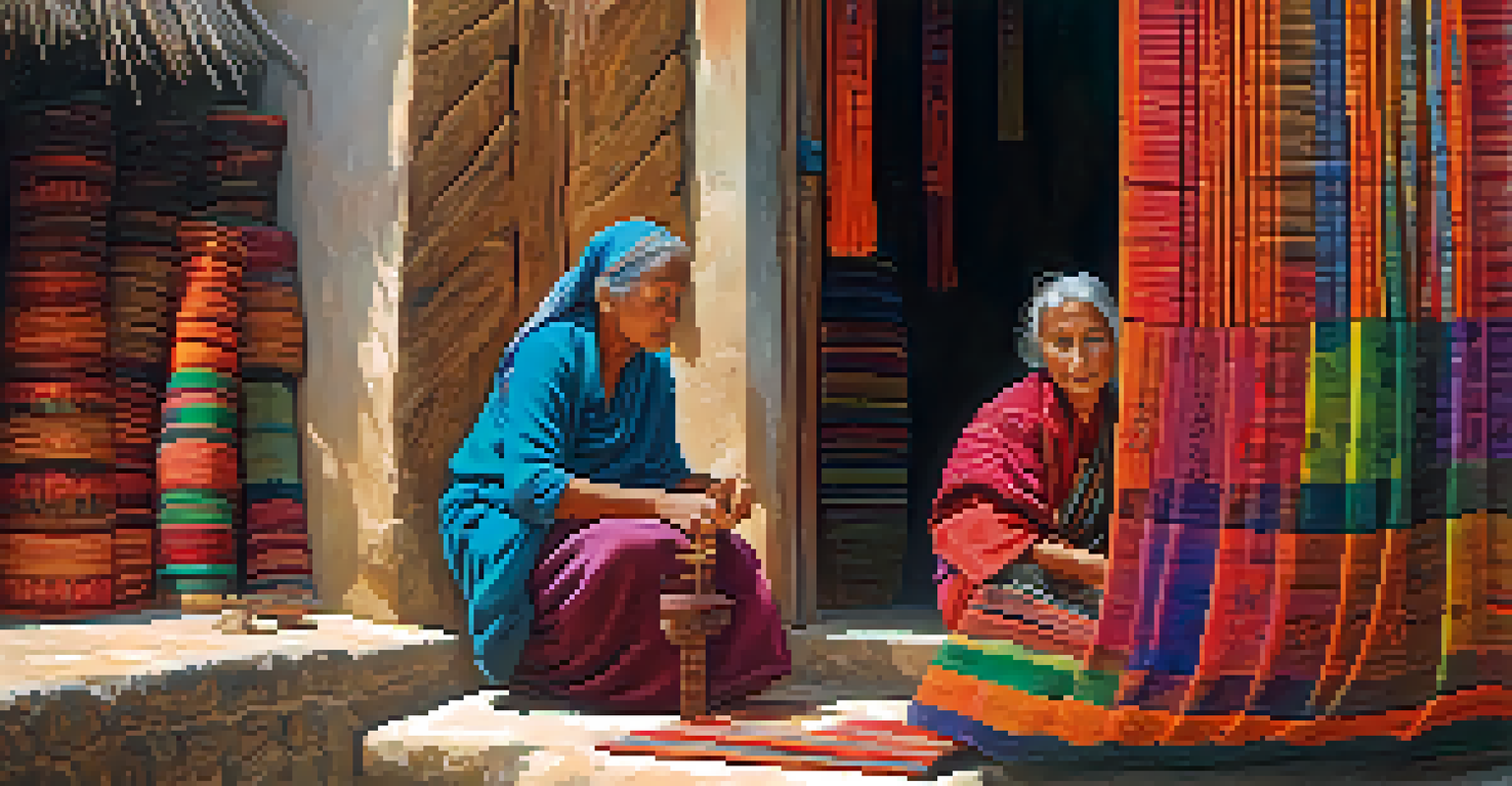The Role of Cultural Exchanges in Sustainable Tourism

Understanding Cultural Exchanges and Their Importance
Cultural exchanges involve sharing traditions, customs, and ideas between different communities. They foster understanding and respect among diverse cultures, which is vital in our increasingly globalized world. By engaging in these exchanges, travelers can gain deeper insights into the local way of life, enhancing their overall experience.
Travel is fatal to prejudice, bigotry, and narrow-mindedness, and many of our people need it sorely on these accounts. Broad, wholesome, charitable views of men and things cannot be acquired by vegetating in one little corner of the earth all one's lifetime.
For instance, a traveler who participates in a cooking class with local chefs not only learns about traditional dishes but also understands the cultural significance behind them. This type of interaction can create lasting memories and a genuine connection to the place visited. Such experiences contribute to a more enriching travel narrative.
Moreover, cultural exchanges promote empathy and appreciation for different lifestyles, which is essential in combating stereotypes. When tourists engage meaningfully with locals, they support a more inclusive form of tourism that values authenticity and mutual respect.
Cultural Exchanges as a Catalyst for Sustainable Tourism
Sustainable tourism aims to minimize environmental impact while enhancing local cultures and economies. Cultural exchanges play a pivotal role in achieving this balance. By encouraging tourists to engage with local communities, we can ensure that tourism benefits everyone involved.

For example, when tourists buy handmade crafts or participate in local festivals, they directly contribute to the local economy. This not only supports artisans and cultural practitioners but also helps preserve traditional crafts and practices that might otherwise fade away. Thus, cultural exchanges become a means of sustaining local heritage.
Cultural Exchanges Foster Understanding
Engaging in cultural exchanges allows travelers to gain insights into local traditions and customs, promoting empathy and respect among diverse communities.
Additionally, these interactions help raise awareness of conservation issues. When travelers learn about local environmental challenges from residents, they are more likely to support sustainable practices, such as eco-friendly tours or conservation efforts. This synergy between cultural exchange and sustainability is a win-win for both tourists and host communities.
Enhancing Authenticity Through Cultural Interactions
Authenticity is a buzzword in the tourism industry, and cultural exchanges are key to achieving it. When tourists engage with locals, they experience a destination in its true form, rather than a sanitized or commercialized version. This authentic experience is what many travelers seek today.
The beauty of the world lies in the diversity of its people.
Take, for example, a traveler who visits a small village to learn about traditional weaving techniques. Instead of simply purchasing a souvenir, they gain firsthand knowledge of the craftsmanship involved. This not only enriches their travel experience but also fosters a deeper appreciation for the culture behind the product.
Furthermore, promoting authentic cultural exchanges encourages host communities to share their heritage proudly. This pride can lead to a revitalization of local traditions and practices that might otherwise be overlooked, ensuring they remain vibrant for future generations.
The Economic Benefits of Cultural Exchanges
Cultural exchanges can significantly boost local economies in sustainable tourism. By attracting travelers interested in immersive experiences, communities can create new income opportunities. These exchanges often lead to the development of local businesses, such as guesthouses, restaurants, and tour companies.
For instance, a village that offers homestays allows visitors to experience local life while generating income for families. This model not only provides a unique experience for travelers but also stimulates the local economy. As more visitors seek these authentic experiences, the demand for such services grows.
Boosting Economies Through Culture
Cultural exchanges create new income opportunities for local communities by attracting tourists interested in immersive, authentic experiences.
Moreover, cultural exchanges can lead to partnerships between local businesses and international travel agencies. This collaboration can amplify marketing efforts, drawing more tourists and enhancing economic resilience within the community. In this way, cultural exchanges serve as a foundation for sustainable economic growth.
Building Bridges: Cultural Exchanges and Global Understanding
In a world often divided by cultural misunderstandings, cultural exchanges serve as vital bridges. By facilitating interactions between diverse groups, we can foster global understanding and cooperation. This is particularly important in the context of tourism, where travelers can become ambassadors of their cultures.
When tourists share their own cultures while learning about others, they contribute to a more interconnected world. For example, a traveler sharing their music or art with locals can spark conversations and friendships that transcend geographical boundaries. Such exchanges enrich both the traveler and the host community.
Additionally, these interactions can lead to collaborative projects that address global challenges, such as climate change or social inequality. By working together, communities can develop solutions that benefit not just one group but society as a whole, reinforcing the idea that cultural exchanges are essential for sustainable development.
Challenges in Implementing Cultural Exchanges
While cultural exchanges hold immense potential for sustainable tourism, they also come with challenges. Misunderstandings can arise when cultures collide, leading to unintended disrespect or appropriation of traditions. It's crucial for both tourists and hosts to approach these interactions with sensitivity and respect.
For instance, a tourist may unknowingly engage in a local practice without fully understanding its significance, which could offend community members. Educating travelers about cultural norms before their visit can help mitigate these risks and foster more respectful interactions. This awareness is vital for maintaining the integrity of cultural exchanges.
Challenges in Cultural Interaction
Misunderstandings and commercialization can undermine the integrity of cultural exchanges, highlighting the need for sensitivity and education in these interactions.
Moreover, there can be economic pressures that lead to the commercialization of cultural experiences, diluting their authenticity. Communities must find a balance between sharing their culture and preserving its essence. This requires thoughtful planning and collaboration to ensure that cultural exchanges remain meaningful and beneficial for everyone involved.
The Future of Sustainable Tourism and Cultural Exchanges
Looking ahead, the future of sustainable tourism will likely hinge on the success of cultural exchanges. As travelers increasingly seek authentic experiences, communities that prioritize these interactions will thrive. This trend presents a unique opportunity to revitalize local cultures and economies.
Technology can also play a role in enhancing cultural exchanges. Virtual experiences, for example, can connect travelers with communities worldwide, allowing them to engage with different cultures from the comfort of their homes. This can spark interest in future travel and foster a deeper understanding of global diversity.

Ultimately, by prioritizing cultural exchanges within sustainable tourism strategies, we can create a more equitable and interconnected world. This vision not only benefits travelers and host communities but also contributes to the preservation of cultural heritage and the promotion of global harmony.